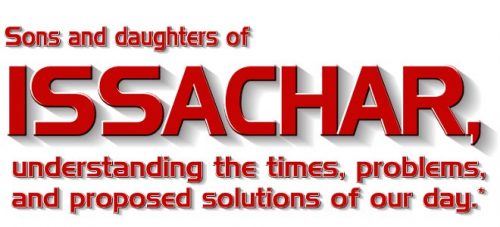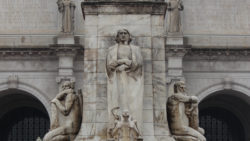Edited from Roger Kimball’s February 2019 Imprimis article. Reprinted by permission from Imprimis, a publication of Hillsdale College.
In centuries past, iconoclasm was common. Destroy the statues of previous kings and gods and you destroy their memory and status. In Egypt, the faces on nearly every statue have their noses broken.
Today, on the one hand we would consider these past actions as vandalism, yet modern crusaders seek identical goals in the name of political correctness.
Recent reports point towards a new age of such benighted activities, driven by a new intolerance of this nation’s past. This Orwellian censorship of free speech and disrespect for the past seeks to erase parts of our common history viewed as problematic by social justicewarrior censors.
Stories have arisen at multiple universities of such efforts. At the University of Notre Dame, twelve 134-year-old murals depicting the life of Christopher Columbus were shrouded at the insistence of a group of student agitators. At the University of Pennsylvania, William Shakespeare’s portrait was replaced in the English department’s main hallway with the photograph of an obscure author. At Yale, the memory of
John C. Calhoun, an 1804 graduate, was expunged because has was an apologist for slavery. Similarly, a carving of a Puritan holdinga musket and an Indian with bow and arrow was viewed as too much by staff of Yale’s Sterling Memorial Library. Yale’s president, Peter Salovey, ordered the carving replaced. Yet in true Orwellian fashion he explained that an initial masking of only the musket would represent “an erasure of history, which is entirely inappropriate at a university.” Far better to remove the entire carving than to highlightremoval of the offending musket.
The modus operandi of such attacks is now well known: First, a vocal minority claims victim status and demands the destruction, removal, or concealment of some object of disapproval. Second, complicitous powers-that-be capitulate to these demands, offering groveling mea culpa’s.
In the “bad old days,” librarians and college presidents were people who sought to protect the past, that vast storehouse of our common inheritance. In today’s “enlightened” times, librarians and college presidents collude to erase unwanted elements of our history.
The psychopathology behind such events is instructive. Beyond the initial paroxysms of indignation and outrage, it seems these self-righteous virtue-warriors seek a form of communal ecstasy following each victory. This communal element allows the impact to be magnified. Consider, for example, the mass ecstasy accompanying Robespierre’s Reign of Terror during the French Revolution in 1793 as the tumbrilles rolled thousands of”the rich” to be slaughtered by the guillotines, all while claiming the new France to be a “Republic of Virtue.”
What has happened to our culture and educational institutions that so many students jump from their feelings of being offended (and how delicate they are, how quick to take offense!) to self-righteous demands to repudiate the thing that offends them? As education has become ever more expensive why has it lead not to broader understanding and acceptance/tolerance, but to narrower horizons?
It seems the goal is not to understand and appreciate where our country has been and where it can improve, but to simply assault and remove statues and works of art seeking to squeeze our nation’s complex history into a box defined by the evolving rules of political correctness.
To listen to these people, you might think they view George Orwell’s statement in “1984” meant to be a warning of the dangers ahead instead more as a how-to manual to manipulate our society. He wrote, “Every record has been destroyed or falsified, every book has been rewritten, every picture has been repainted, every statue and street and building has been renamed, every date has been altered. And that process is continuing day by day and minute by minute. History has stopped.”
Why would Orwell say that “History has stopped.”? Because Orwell understood that unless we have a true perspective about our collective history, to let it speak for itself about itself, if it keeps being rewritten and reinterpreted to fit the fashions of every succeeding generation, its true meaning will eventually be lost.
And while some might argue that what a bastion of privilege and unaccountability like Yale does is their to their own detriment, clearly what happens at Yale affects us all because Yale graduates have a much greater influence on our culture because of the positionstheir graduates fill in governments. Yale and other elite universities also are among the chief drivers of “progressive” hostility to free expression. Their politically correct attitudes have insinuated themselves into the bloodstream of our public discourse.
Herbert Marcuse’s 1965 essay entitled “Repressive Tolerance,” may have also played a heavy roll in changing attitudes about tolerance. Marcuse, a Marxist of the Frankfurt School, distinguished between two kinds of tolerance: the one he described as “bad” or “false” tolerance, which we would understand as the “true” definition tolerance. This older version encompasses such chestnuts as, “I disapprove of what you say, but I will defend to the death your right to say it.”
In its place, Marcuse’s new “liberating tolerance,” which works out as tolerance for me, but none for thee, he defined it as “intolerance against movements from the Right and toleration of movements from the Left.” This new dispensation teaches: “I disapprove of what you say, therefore you may not say it.”
(Of course, two can play at that game.)
This new line of intolerance has led to puritanical censure in the workplace.
Consider James Damore, Google engineer, who wrote an internal memo decrying the company’s cult-like “echo chamber” of political correctness and ham-handed efforts to nurture “diversity” in hiring and promotion. Damore was fired for the “offense” of expressing his opinion in a company discussion forum designed to encourage free expression. We thus find an upside-down world where “Free Expression” means merely another venue for the promotion of forced political indoctrination in the workplace.
In the Google world, 1950’s morality has thus been replaced by a just as oppressive social justice creed involving dogmas of race, fossil fuels, sexuality, and the essential lovableness of jihadist Muslims. Dissent from this orthodoxy and you find yourself out of a job.
Beyond the workplace this ramped-up intolerance has also spurred groups such as ProPublica, the Southern Poverty Law Center, and other leftist thug groups to expand their definitions of hate beyond the traditional “Daily Stormer,” a vile anti-Semitic news website, to include groups like
“Jihad Watch,” an educational organization attempting to warn the public of the continued terrorist activities by Islamic jihadist groups.
These radical prejudices of the 1960s have now had several decades to percolate through our society and fester into a new set of toxic nostrums masquerading as moral imperatives.
The current controversies over “monuments” highlights the susceptibility of “liberating tolerance” to become a new form of fanaticism. It reminds us that in the great battle between the partisans of freedom and the partisans of these new virtues, freedom is negotiable, until it rouses itself to fight back. At stake is nothing less than the survival of our common history.

